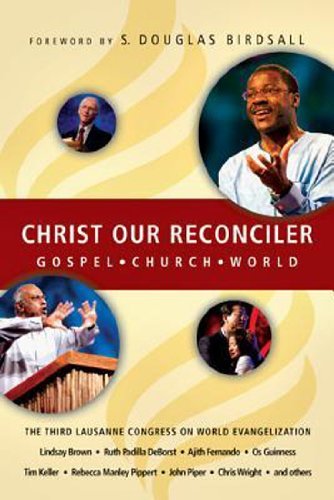Christ Our Reconciler
When 2,700 Christians from 150 countries gathered in Lausanne, Switzerland in 1974, it was, according to TIME, “a formidable forum, possibly the widest ranging meeting of Christians ever held.” As I wrote in Serving Justice vs. Saving Souls for RELEVANT late last year, that first Lausanne gathering represented a watershed moment for evangelicals, helping us move past the word-and-deed dichotomy that had no business existing in the first place.
A significant part of that initial gathering’s contribution was the Lausanne Covenant, which affirmed (in part): “Although reconciliation with other people is not reconciliation with God, nor is social action evangelism, nor is political liberation salvation, nevertheless we affirm that evangelism and socio-political involvement are both part of our Christian duty.”
In the nearly four decades that have passed since then – through two more full-fledged global congresses and a variety of smaller events – the Lausanne Movement has continued to convene Christians from around the world under the auspices of its audacious tagline: “The whole Church taking the whole Gospel to the whole World.”
Following Cape Town 2010, the third global Lausanne Congress, InterVarsity Press published Christ Our Reconciler: Gospel, Church, World, a wonderful collection of messages from the gathering’s main speakers.
The book is organized based on the themes of each of the six days of the gathering: Truth, Reconciliation, World Faiths, Priorities, Integrity, and Partnership. There are contributions by Christians from Africa, Asia, Europe, Latin America, North America, and the Middle East, drawing on the diversity represented by delegates from 198 countries around the world. It’s rare to find a book with such diverse contributors, yet all are united around their commitment to the gospel.
A particular highlight of the book for me was reading the testimonies of believers from North Korea, the Holy Land, Nigeria, South Africa, the UK, and Egypt. Being a Christian in any one of those places is a very different experience from being a Christian anywhere else, and each context certainly has its unique challenges, whether outright persecution, or violent conflict, or systemic injustice, or the apathy of an affluent society. For those of us immersed in North American evangelical sub-culture, we’d do well to be reminded that the latest controversial tweet from Mark Driscoll (and the obligatory ensuing blog response from Rachel Held Evans) isn’t necessarily the most important thing to be concerned about. These testimonies reminded me yet again that the church is so much bigger than any particular Christian tribe, and that we have much to learn from each other.
There were other highlights in the book as well. For instance, Ajith Fernando of Sri Lanka on embracing suffering in service; Chris Wright of the UK calling the church back to humility, integrity, and simplicity; Antoine Rutayisire of Rwanda on the gospel of reconciliation; and Ruth Padilla DeBorst of Argentina/Costa Rica calling us to pledge allegiance to the Lord of history, the only true Prince of Peace.
Read this book to be encouraged, to be challenged, and to be equipped to participate more fully in God’s global mission. We have much to learn from the saints who are serving the church in varying degrees of obscurity around the world, and this book is a great way to dip our respective toes in those deep, deep waters.
If this is your first introduction to the Lausanne Movement, I’d encourage you to spend some time studying the Covenant for yourself. You may also find the Cape Town Commitment, which includes a confession of faith and a call to action, to be helpful.
I received a free copy of this book from the publisher in exchange for my honest thoughts.
